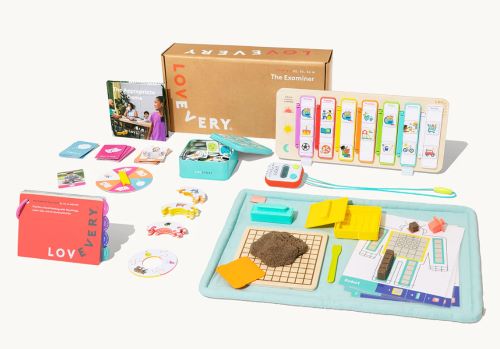Lovevery has captured the hearts of parents and caregivers with its thoughtfully curated play kits designed to support a child’s development at every stage. By partnering with child development experts, Lovevery has created a comprehensive approach to play that fosters cognitive, physical, social, and emotional growth. Let’s delve into the world of Lovevery and explore how their play kits align with your child’s developmental milestones, month by month.
Newborn to 3 Months
During these early weeks, your baby is rapidly absorbing information about the world around them. Lovevery‘s play kits for this age focus on sensory stimulation and building foundational skills. Look for toys that encourage:
- Visual tracking: High-contrast patterns and mobile toys help develop eye coordination.
- Hearing development: Soft rattles and musical toys stimulate auditory senses.
- Tactile exploration: Soft textures and different materials promote sensory discovery.
- Gross motor skills: Tummy time support and play mats encourage movement and strength building.
3 to 6 Months
As your baby becomes more alert and curious, Lovevery‘s play kits introduce new challenges and opportunities for exploration. Key developmental areas include:
- Object permanence: Peek-a-boo toys and disappearing objects help babies understand that things still exist even when out of sight.
- Fine motor skills: Reaching, grasping, and batting at toys enhance hand-eye coordination.
- Social interaction: Interactive toys and mirrors encourage social engagement and communication.
- Cognitive development: Cause-and-effect toys like rattles and teethers promote problem-solving skills.
6 to 9 Months
At this stage, babies are becoming increasingly mobile and independent. Lovevery play kits focus on supporting these new abilities while continuing to nurture cognitive and social development. Key areas of focus include:
- Sitting and crawling: Play mats and activity centers encourage gross motor skills and balance.
- Exploration: Sensory toys with various textures and sounds promote curiosity and discovery.
- Problem-solving: Stacking cups and shape sorters introduce early problem-solving skills.
- Language development: Interactive toys that encourage babbling and communication.
9 to 12 Months
As your baby takes their first steps and explores their world with newfound independence, Lovevery play kits continue to support their development. Key developmental areas include:
- Walking and balance: Push toys and activity walkers encourage gross motor skills.
- Fine motor skills: Building blocks and stacking toys enhance hand-eye coordination and dexterity.
- Imaginative play: Dolls and pretend play items foster creativity and social interaction.
- Cognitive development: Sorting and matching toys promote logical thinking and problem-solving.
12 to 18 Months
Toddlers are full of energy and curiosity at this age. Lovevery play kits focus on encouraging exploration, independence, and language development. Key areas of focus include:
- Gross motor skills: Balls, ride-on toys, and outdoor play equipment promote physical activity.
- Fine motor skills: Puzzles, art supplies, and sensory bins enhance hand-eye coordination and creativity.
- Language development: Talking toys and books encourage vocabulary expansion and communication.
- Emotional development: Role-playing toys and puppets help children understand and express emotions.
18 to 24 Months
As toddlers become more independent and assertive, Lovevery play kits support their growing cognitive, social, and emotional skills. Key areas of focus include:
- Pretend play: Dress-up clothes, play kitchens, and toy vehicles encourage imaginative play and storytelling.
- Problem-solving: Puzzles, building sets, and sorting toys challenge cognitive abilities.
- Social skills: Cooperative games and toys that encourage sharing and taking turns.
- Emotional regulation: Comfort toys and books that help children manage big emotions.
Remember: Every child develops at their own pace. Lovevery play kits provide a foundation for learning and growth, but it’s essential to follow your child’s interests and adjust playtime accordingly. By incorporating these age-appropriate activities into your child’s daily routine, you can create a stimulating and nurturing environment that supports their overall development.



